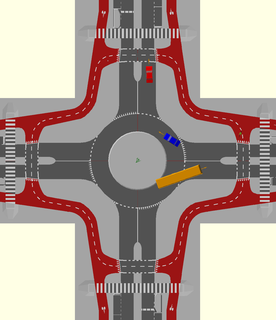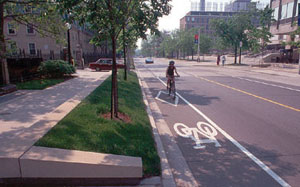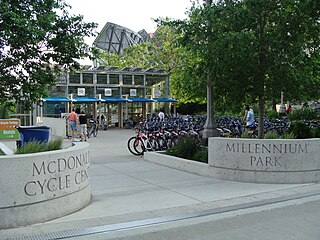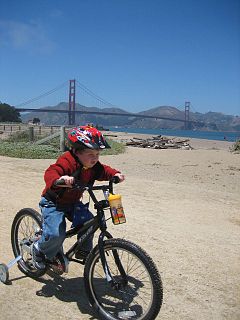Related Research Articles

Bicycle-friendly policies and practices help some people feel more comfortable about traveling by bicycle with other traffic. The level of bicycle-friendliness of an environment can be influenced by many factors including town planning and cycling infrastructure decisions. A stigma towards people who ride bicycles and fear of cycling is a social construct that needs to be fully understood when promoting a bicycle friendly culture.

Vehicular cycling is the practice of riding bicycles on roads in a manner that is in accordance with the principles for driving in traffic, and in a way that places responsibility for safety on the individual.
Adventure Cycling Association is a nonprofit member organization focused on travel by bicycle. Headquartered in Missoula, Montana, Adventure Cycling develops cycling routes, publishes maps, provides guided trips, and advocates for better and safer cycling in the U.S. The organization grew from a mass cross-country bicycle ride in 1976 to celebrate the U.S. Bicentennial. Adventure Cycling also publishes a magazine, Adventure Cyclist.

Bicycle transportation planning and engineering are the disciplines related to transportation engineering and transportation planning concerning bicycles as a mode of transport and the concomitant study, design and implementation of cycling infrastructure. It includes the study and design of dedicated transport facilities for cyclists as well as mixed-mode environments and how both of these examples can be made to work safely. In jurisdictions such as the United States it is often practiced in conjunction with planning for pedestrians as a part of active transportation planning.

Since the advent of the bicycle in the 1860s, Chicago has been distinguished as one of the premier cycling locations in the United States, with such public cycling destinations as Grant Park, Burnham Park and the Chicago Park District's Lakefront Trail.

Transportation Alternatives is a non-profit organization in New York City which works to change New York City's transportation priorities to encourage and increase non-polluting, quiet, city-friendly travel and decrease automobile use. TransAlt seeks a transportation system based on a "Green Transportation Hierarchy" giving preference to modes of travel based on their relative benefits and costs to society. To achieve these goals, T.A. works in five areas: Cycling, Walking and Traffic Calming, Car-Free Parks, Safe Streets and Sensible Transportation. Promotional activities include large group bicycle rides.

Transportation demand management, traffic demand management or travel demand management (TDM) is the application of strategies and policies to reduce travel demand, or to redistribute this demand in space or in time.

Complete streets is a transportation policy and design approach that requires streets to be planned, designed, operated and maintained to enable safe, convenient and comfortable travel and access for users of all ages and abilities regardless of their mode of transportation. Complete Streets allow for safe travel by those walking, cycling, driving automobiles, riding public transportation, or delivering goods.

The San Francisco Bicycle Coalition (SFBC) is a California 501(c)(4) nonprofit public-benefit corporation established to "transform San Francisco's streets and neighborhoods into more livable and safe places by promoting the bicycle for everyday transportation." Founded in 1971, dormant through much of the 1980s, and re-founded in 1990, the SFBC in 2011 has a dues-paying membership of over 12,000 and is considered to be one of the most influential membership-based advocacy organizations in San Francisco.
Critical Mass Melbourne is an informal grass roots collection of people who gather to take part in the month's Critical Mass event, which is a cycling event typically held in various cities throughout the world on the last Friday of every month, for traveling as a group through city or town streets on bikes. The rides in Melbourne began in November 1995, and have occurred every month since, with between 100 and 1000 riders involved. Like most Critical Mass events in other cities, the Melbourne rides have fostered the development of a coherent urban cycling community, the focus of which is the temporary intentional community of the rides themselves.
Cycling in Sydney, New South Wales, Australia takes place for recreation, commuting and as a sport. Sydney has a hilly topography and so may require a slightly higher level of fitness from cyclists than flatter cities such as Melbourne and Canberra. Sydney depends heavily on motor vehicles where traffic and public transport operate at capacity. This means that cyclist are often competing with motorists for limited space on busier roads, and for limited government resources for expenditure on road infrastructure. In its favour, Sydney has a generally mild climate and there are active cycling groups.

Cycling in New York City is associated with mixed cycling conditions that include dense urban proximities, relatively flat terrain, congested roadways with "stop-and-go" traffic, and streets with heavy pedestrian activity. The city's large cycling population includes utility cyclists, such as delivery and messenger services; cycling clubs for recreational cyclists; and increasingly commuters. Cycling is increasingly popular in New York City; in 2018 there were approximately 510,000 daily bike trips, compared with 170,000 daily bike trips in 2005.

McDonald's Cycle Center is an indoor bike station in the northeast corner of Millennium Park in the Loop community area of Chicago, in the U.S. state of Illinois. The city of Chicago built the center at the intersection of East Randolph Street and Columbus Drive, and opened it July 2004. Since June 2006, it has been sponsored by McDonald's and several other partners, including city departments and bicycle advocacy organizations. The bike station, which serves bicycle commuters and utility cyclists, provides lockers, showers, a snack bar with outdoor summer seating, bike repair, bike rental and 300 bicycle parking spaces as of 2004. The Cycle Center is accessible by membership and day pass. It also accommodates runners and inline skaters, and provides space for a Chicago Police Department Bike Patrol Group.

Toronto, like many North American cities, has slowly been improving its cycling infrastructure. The number of cyclists has been increasing progressively, particularly in the city's downtown core. As cycling conditions improve, a cycling culture has grown and alternatives such as automobiles are seen as less attractive. The politics of providing resources for cyclists, particularly dedicated bike lanes, has been contentious, particularly since the 2010s.

Bike East Bay, formerly known as East Bay Bicycle Coalition, is a Californian non-profit organization that worked since 1972 toward "promoting bicycling as an everyday means of transportation and recreation" in Alameda and Contra Costa counties of the California's East Bay. As a tax-exempt 501(c)3 grassroots bicycle advocacy organization, Bike East Bay endeavors to broaden awareness of bicycling with local, regional, and state government agencies and their staff, as well as elected officials, and the general public they represent.
Cycling in Illinois encompasses recreation, bikeways, laws and rules, and advocacy. The director of the Illinois Department of Natural Resources, Joel Brunsvold, explained Illinois cycling opportunities: “Bicycle riding is one of the most popular outdoor recreational activities in Illinois, enjoyed by young and old alike...Illinois has a variety of trails for the public to enjoy. The terrain includes flat prairie land to rolling hills, towering bluffs to the breathtaking river and lakefront views.” Many communities across the state are updating bicycle infrastructure in order to accommodate the increased number of cyclists on the roads.

Cycling in San Francisco has grown in popularity in recent years, aided by improving cycling infrastructure and community support. San Francisco's compact urban form and mild climate enable cyclists to reach work, shopping, and recreational destinations quickly and comfortably. Though San Francisco's famed steep hills can make cycling difficult, many parts of the city are relatively flat, including some of the most densely populated. However, heavy automobile traffic, the lack of bike lanes on many streets, and difficulty in crossing major streets deter most residents from cycling frequently in San Francisco.

Cycling in Canada is experienced in various ways across a geographically huge, economically and socially diverse country. Among the reasons for cycling in Canada are for practical reasons such as commuting to work or school, for sports such as road racing, BMX, Mountain bike racing, freestyle BMX, as well as for pure recreation. The amount and quality of bicycle infrastructure varies widely across the country as do the laws pertaining to cyclists such as bicycle helmet laws which can differ by province.

Cycling infrastructure refers to all infrastructure permissible for use by cyclists, including the network of roads and streets used by motorists, except where cyclists are excluded, along with bikeways from which motor vehicles are excluded – including bike paths, bike lanes, cycle tracks, rail trails and, where permitted, sidewalks. Cycling infrastructure also includes amenities such as bike racks for parking, shelters, service centers and specialized traffic signs and signals. Cycling modal share is strongly associated with the size of local cycling infrastructure.
Better Environmentally Sound Transportation (BEST) is a Vancouver-based charity focused on promoting walking, cycling, public transit, and other forms of sustainable transportation in Metro Vancouver. The organization was founded in 1991 and has several active projects as of 2019.
References
- ↑ "Athens-Clarke Safe Cycling Association (original site)". Archived from the original on 2007-08-19. Retrieved 2008-02-14.
- ↑ UGA Libraries: Athens-Clarke County Transportation
- ↑ Baxter Street lane reconfiguration gets go-ahead, Athens Banner-Herald, September 5, 2000.
- ↑ BikeAthens gives disabled man ride to work, Athens Banner-Herald, July 25, 2005.